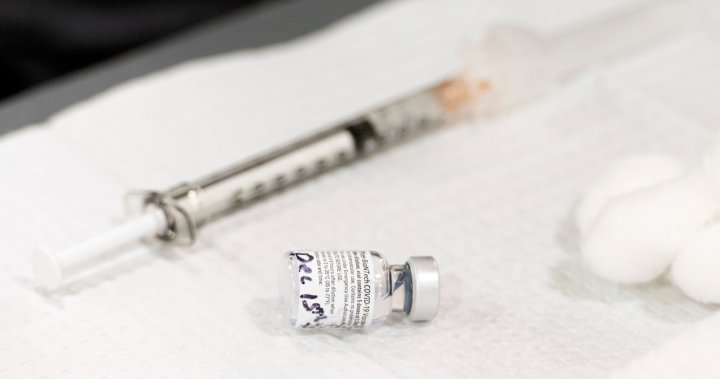Different vaccines to protect against the new coronavirus should not be mixed and matched, despite Britain’s recent decision to allow the practice to be used on rare occasions, health experts say.
Mixing different coronavirus vaccines without any data to suggest the safety and effectiveness of the practice is “a big bet,” said Dr. Colin Furness, an infection control epidemiologist and an assistant professor at the University of Toronto.
“I think it’s irresponsible … it’s unethical because we don’t know what it does,” he said. “We don’t know what the effectiveness is, we don’t know what the side effects are.”
Read More:
Britain will allow mixing of the coronavirus vaccine on rare occasions
Dr. Isaac Bogoch, professor of infectious diseases at the University of Toronto, said that while there may be “some theoretical reasons” for explaining why the vaccine mix “can provide decent protection for COVID-19 infections,” the data are not yet conclusive.
“Until we see better data to support this, I don’t think we will see such activity in Canada,” he said.

The comments came after Britain launched new guidelines on New Year’s Eve, which will allow people seeking their second dose to receive injections of different COVID-19 vaccines on rare occasions.
“(If) the same vaccine is not available, or if the first product received is unknown, it is reasonable to offer a dose of the product locally available to complete the schedule,” according to the guidelines.
Mary Ramsay, head of immunizations at Public Health England, said that this would only happen on extremely rare occasions and that the government was not recommending mixing vaccines, which require at least two doses administered several weeks apart.
[ Sign up for our Health IQ newsletter for the latest coronavirus updates ]
She said that “every effort must be made to give them the same vaccine.
“But when that is not possible, it is better to give a second dose of another vaccine than ever before,” she said.
Read More:
Cabbage, cavemen and miracle cures: the speed with which the science of COVID-19 can confuse the public
What did Health Canada say?
Health Canada’s National Immunization Advisory Committee (NACI) currently recommends that the vaccine series “be completed with the same vaccine product COVID-19”.
“Currently, there are no data on the interchangeability of COVID-19 vaccines,” says the agency’s website.
However, according to the NACI, if the vaccine used for a previous dose “is not known or is not available, attempts should be made to complete the serial vaccine with a similar type of vaccine COVID-19 (eg vaccine of mRNA). “
“In the context of the limited supply of the COVID-19 vaccine and the lack of evidence on the interchangeability of the COVID-19 vaccines, the previous dose can be counted and the series does not need to be restarted,” says the website.

The agency said that “active surveillance of the effectiveness and safety of this mixed scheme will be important for these individuals”, adding that “accurate registration of vaccines received will be critical”.
According to NACI, the agency “will continue to monitor the evidence” and update its recommendations as needed.
To date, Health Canada has approved two coronavirus vaccines for use nationwide. Both are mRNA vaccines and require two doses to provide about 95 percent protection against COVID-19.
Read More:
‘Real tension’: Should all coronavirus vaccine volunteers now get the real thing?
The Pfizer-BioNTech vaccine requires two injections to be administered 21 days apart, while doses of the Moderna vaccine must be administered 28 days apart.
Bogoch said we have “good data” about these vaccines and how they should be administered.
Asked if there are any circumstances in which Canada should allow different vaccines to be mixed and combined before data are available, Bogoch said, “no”.
“I’m not entirely sure, outside of a clinical trial, what the role would be in conducting this type of activity,” he said.

Furness also said that vaccines should not be mixed unless in a laboratory setting, where participants gave informed consent.
“If you want to do a test to test them, for sure,” he said. “But it will take many months.”
Anything else, said Furness, would be “experimental”.
“Human history is really full of experiences in people without understanding that they are being experienced,” he said. “And that is really not right.”
Read More:
Canada has approved 2 vaccines against the coronavirus. How are the other candidates progressing?
For now, Bogoch said we should focus on launching approved vaccines as soon as possible, the way they should be administered.
“TThe objective is to have as few vaccines as possible in the freezers and to take the needles in the arms as quickly as possible to the groups at greatest risk and to prevent death and suffering, ”he said.
–With Reuters files
See link »
© 2021 Global News, a division of Corus Entertainment Inc.


